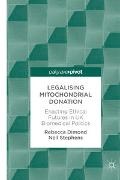Description
Product details
| Authors | Rebecca Dimond, Neil Stephens |
| Publisher | Springer, Berlin |
| Languages | English |
| Product format | Hardback |
| Released | 03.04.2018 |
| EAN | 9783319746449 |
| ISBN | 978-3-31-974644-9 |
| No. of pages | 147 |
| Dimensions | 155 mm x 220 mm x 14 mm |
| Weight | 300 g |
| Illustrations | VII, 147 p. |
| Subjects |
Social sciences, law, business
> Sociology
> Miscellaneous
Philosophie, Bioethik, C, Geschichte der Naturwissenschaften, Sozialwesen und soziale Dienste, Kommunal-, Regional- Landes und Lokalregierung, History, Technologie, allgemein, Philosophy, Social Policy, Technology: general issues, Social Sciences, CRISPR/Cas9, History of Science, Bioethics, Philosophy of Technology, Moral Philosophy and Applied Ethics, Central / national / federal government policies, Social medicine, Medical Sociology, Human Fertilisation and Embryology Authority, Wellcome Trust Centre for Mitochondrial Research |
Customer reviews
No reviews have been written for this item yet. Write the first review and be helpful to other users when they decide on a purchase.
Write a review
Thumbs up or thumbs down? Write your own review.

